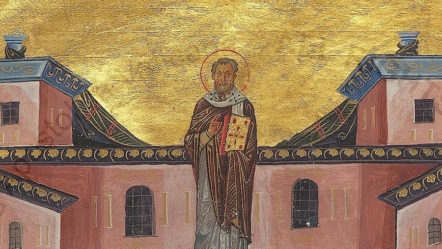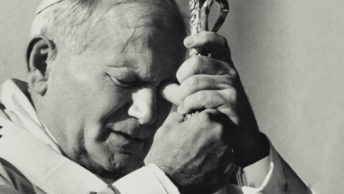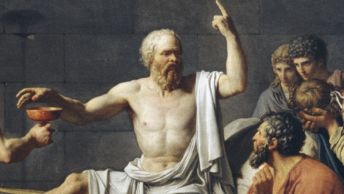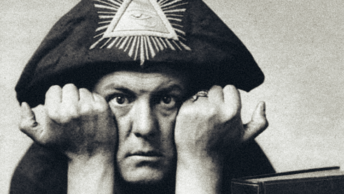During World War II an American airman named John was blinded in an airplane explosion. He was discharged from the Army Air Corps, and for the next twelve years he couldn’t see a thing. During these years he lived for a time with his parents in Texas, and then he married, had two children, and got along as well as he could. One day, while walking down a street using his white cane, John suddenly began to see what looked like “red sand” in front of his eyes—and then, without warning, his sight suddenly returned. An eye specialist later explained that the explosion twelve years earlier had apparently caused a blockage of blood to the optic nerve; when this blockage finally opened, his sight was restored. More important to John than the explanation, however, was the reality of being able to see again; as he said, “You don’t know what it is for a father to see his children for the first time. They were both much more beautiful than I ever suspected” (Link, Illustrated Sunday Homilies, Year A, Series I, p. 25).
John’s dramatic experience can give us some idea of what the blind man in the Gospel experienced when Jesus gave him his sight: he had lived in a world of darkness, but then was suddenly able to see everything and everyone around him. Through Christ, we’re all invited to experience something like this in a spiritual sense. Humanity was enslaved in the darkness of sin, but Jesus’ saving death has given us all a chance to enter into God’s light. This, however, is an ongoing process that depends on our cooperation. Each one of us is called to continue walking in the light of Christ, while also sharing it with others.
Letting ourselves be guided by the light of Jesus means learning that our ways are not always God’s ways; He sees things differently than we do. This is illustrated when Samuel was certain Jesse’s oldest son was the one God had selected to be the next king. However, the Lord had instead chosen David, the youngest, and even a great prophet like Samuel—one who was wise in the ways of the Lord—had to be reminded that God judges not by appearances, but by what He sees in the human heart. We ourselves can profit from this reminder, for we’re often tempted to judge others or assume we know what’s best. We must instead be humble before God; otherwise, we risk blinding ourselves to His truth. Being guided by the light of Christ means avoiding deeds of darkness. Things like injustice, dishonesty, and hatred plunge us into spiritual darkness; we lose sight of the way of salvation. Baptism has freed us from this slavery, bringing us into the light; in response to this gift, we must live honorably. If we fail, the Sacrament of Reconciliation and other experiences of God’s forgiveness can restore our spiritual sight. Growing in this manner is our challenge during Lent; as St. Paul says, “Awake, O sleeper, and arise from the dead, and Christ will give you light.” Walking in the light of Christ means accepting the gift of God’s grace. The blind man did this, and so he was freed not only from physical blindness, but—much more importantly—from spiritual blindness. This man boldly proclaimed Jesus to be a prophet, even though the religious leaders wanted him to denounce Jesus; when Our Lord later found him and asked him to believe in Him, the man did so without hesitation, bowing down immediately in worship. God’s grace had a miraculous effect in his life. Unfortunately, this was not true for many of the religious leaders, who preferred to remain blinded by sin and who therefore rejected Jesus.
St. Sabinus, an Italian bishop at the beginning of the 4th century, was arrested during a Roman persecution, along with two of his deacons; a small statue of a pagan god was thrust into the bishop’s hands, and he was ordered to worship it. Instead, Sabinus threw the statue to the ground and broke it—whereupon the governor, a man named Venustian, ordered his hands to be cut off. The two deacons were tortured and then executed; Sabinus was thrown into prison. A Christian widow visited him there, bringing her blind son; the bishop blessed him with his handless arms, and the boy instantly received his sight—leading many of the other prisoners who witnessed this miracle to request baptism from the saint. When Venustian, who himself had a serious eye affliction, heard of this, he was touched by divine grace; setting aside his dignity as a government official, he humbly asked the bishop’s forgiveness and prayers. St. Sabinus not only forgave him, but healed him, whereupon the governor and his family became Christians—and, like Sabinus, ended up dying as martyrs (Butler’s Lives of the Saints, December 30).
This is a wonderful and inspiring story because it illustrates several different ways of seeing. St. Sabinus and his companions recognized very clearly that they had to remain faithful to Christ, even at the cost of torture, imprisonment, and death. A widow had the ability to see that if she had faith, her son could be healed of his blindness by the holy bishop. The witnesses of this miracle saw that a religion capable of producing such wondrous blessings must be true, and that their spiritual well-being required them to accept it. A pagan governor was open to recognizing this same truth, even though it ended up costing him and his family their lives. St. Sabinus saw that forgiving the man who had cut off his hands, and praying for the cure of his poor eyesight, would give glory to God. All these things happened because several followers of Christ had the ability to see clearly, and were willing to share the truth with others.
Jesus is calling each one of us into His wonderful light. Perhaps we respond by acts of penance during Lent, or by choosing a particular fault and using God’s grace to overcome it; maybe we decide to enlighten ourselves by studying the Bible or learning more about our faith; perhaps we try to spend extra time in prayer or in attending Lenten devotions or Eucharistic Adoration. All these things can help us see God’s presence, and truth, more clearly, and help us recognize the opportunities we’re given to share the light of the Gospel with others. Jesus is eager to remove our blindness and lead us out of darkness; it’s up to us to respond to Him and walk in the way of His light.








